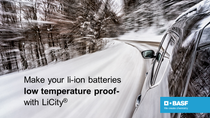BASF markets anode binders for lithium-ion batteries that provide higher capacity and help reduce charging times.
- New anode binder series for Li-ion battery manufacturing
- Licity® binders combine improved battery performance with sustainability features
- Global production and local supply in all regions worldwide
Hong Kong SAR, China – December 16, 2020 – Electric mobility is one of the most promising solutions to today’s climate and energy challenges. According to the International Energy Agency1, around 2.1 million electric vehicles (EV) were sold worldwide in 2019, with China accounting for more than half of the global sales. With the Chinese government’s announcement to promote the green car policy covering public usage, this new clean energy trend is pushing key global automotive OEMs and battery companies to enhance lithium-ion battery technology. To compete in the vigorous markets in China, Japan, and South Korea, the OEM manufacturers have made massive investments in new gigafactories across Asia, Europe, and the United States.
BASF has developed its new Licity product range in order to meet these needs. Depending on their requirements, customers can choose between series with different application focus, e.g., binders suitable for pure graphite or silicon-containing anodes. Irrespective of focus, all Licity binders enable higher capacity, increased number of charge / discharge cycles and reduced charging times. Additionally, Licity binders enhance performance in low temperature environments, provide superior adhesion to collector foil and high compatibility with a broad range of active materials. Moreover, they can be customized to meet customers’ needs.
“Licity lithium-ion battery binders help prevent electrode swelling, thus enabling higher battery capacities. It could encourage more petrol car users to shift to electric mobility,” said Jeff Knight, Senior Vice President, Dispersions & Resins Asia Pacific at BASF. “Many world-leading battery manufacturers are based in Asia Pacific. With our worldwide state-of-the-art manufacturing facilities, we can supply customers with high-quality local products supported by our strong technical expertise and application know-how. Our global presence can also support our customers to extend their production footprints out of Asia by providing consistently high-quality products close to their manufacturing base. We anticipate BASF will become a key global player in this market very soon,” he added.
Besides, customers can benefit from sustainability features: Licity binders are waterborne, carboxylated styrene butadiene copolymers with very low VOC content. Furthermore, the product footprint can be further reduced when Licity products are manufactured according to the biomass balance approach. In this binder version, biomass is fed into BASF’s production process and allocated to the binder. From the raw materials to the delivery of the Licity anode binders, BASF is committed to aligning economic goals with environmental and social responsibility.
More information about the Licity binders can be found here: www.basf.com/licity-battery-binders
1Source: https://www.iea.org/reports/tracking-transport-2020/electric-vehicles
About BASF’s Dispersions & Pigments division
The Dispersions & Pigments division of BASF develops, produces and markets a range of high-quality pigments, resins, additives and polymer dispersions worldwide. These raw materials are used in formulations for a number of industries, including coatings, construction, adhesives, printing and packaging, electronics and paper. With its comprehensive product portfolio and its extensive knowledge of the industry, the Dispersions & Pigments division offers its customers innovative and sustainable solutions and helps them advance their formulations. For further information about the Dispersions & Pigments division, please visit www.dispersions-resins.basf.com.
About BASF
At BASF, we create chemistry for a sustainable future. We combine economic success with environmental protection and social responsibility. More than 117,000 employees in the BASF Group work on contributing to the success of our customers in nearly all sectors and almost every country in the world. Our portfolio is organized into six segments: Chemicals, Materials, Industrial Solutions, Surface Technologies, Nutrition & Care and Agricultural Solutions. BASF generated sales of €59 billion in 2019. BASF shares are traded on the stock exchange in Frankfurt (BAS) and as American Depositary Receipts (BASFY) in the U.S. Further information at www.basf.com.

